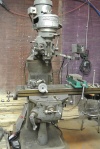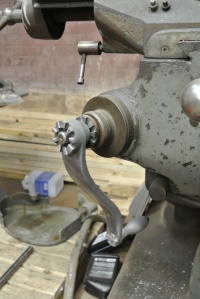Difference between revisions of "Bridgeport Mill"
| Line 27: | Line 27: | ||
* Turn knee crank handle backwards when knee elevation is set and not changing | * Turn knee crank handle backwards when knee elevation is set and not changing | ||
[[File:Kneecrankdisengaged.JPG|200px]] | [[File:Kneecrankdisengaged.JPG|200px]] | ||
| − | |||
| − | |||
| Line 84: | Line 82: | ||
'''To Do''' | '''To Do''' | ||
| + | |||
| + | Fixture examples | ||
'''Extras''' | '''Extras''' | ||
| + | |||
3d printed T-Slot Cleaners, if you would like to make one, or many, for LVL1 | 3d printed T-Slot Cleaners, if you would like to make one, or many, for LVL1 | ||
[https://www.thingiverse.com/thing:1784353 link T-Slot Cleaner] | [https://www.thingiverse.com/thing:1784353 link T-Slot Cleaner] | ||
Revision as of 16:21, 12 January 2019
[Equipment|Back to list of Equipment]]

|
General
|
Generally used to machine flat surfaces, this mill can produce irregular surfaces, drill, bore, cut gears, and cut slots. This milling machine is a vertical spindle machine with a swiveling head.
Safety
- Eye wear is a must.
- Loose clothing and long hair should be appropriately secured from catching on the moving parts.
- Do not make contact with the revolving cutter.
- Place a wooden pad or suitable cover over the table surface to protect it from possible damage.
- Use the buddy system when moving heavy attachments.
- Do not attempt to tighten arbor nuts using machine power.
- When installing or removing milling cutters, always hold them with a rag to prevent cutting your hands.
- While setting up work, install the cutter last to avoid being cut.
- Never adjust the work piece or work mounting devices when the machine is operating
- Chips should be removed from the work piece with an appropriate rake and a brush.
- Shut the machine off before making any adjustments or measurements.
- When using cutting oil, prevent splashing by using appropriate splash guards. Cutting oil on the floor can cause a slippery condition that could result in operator injury.
- Turn knee crank handle backwards when knee elevation is set and not changing
Cutting Speed
The speed of the mill is selected with the Variable Frequency Drive (VFD) mounted to the wall behind the mill. File:HY02D223B.pdf is a PDF of the VFD owner's manual, that may be useful to change the settings for the VFD
To know what speed to run the mill you must know:
- The type of material you are cutting (steel, aluminum, brass, etc)
- The type of cutter you are using (HSS (High Speed Steel) or Carbide)
- The diameter of the cutter
SFM (Surface Feet per Minute)
| Material | HSS | Carbide |
|---|---|---|
| Aluminum | 600 | 800 |
| Brass | 175 | 175 |
| Delrin | 400 | 800 |
| Polycarb | 300 | 500 |
| Stainless Steel | 80 | 300 |
| Steel | 70 | 350 |
Suggested RPM SFPM X 3.82 / Tool Diameter
Example: You are cutting Aluminum with a 3/8" HSS end cutter
600 x 3.82 / 0.375 = 6112 or Set the mill to 6000 RPMS
To Do
Fixture examples
Extras
3d printed T-Slot Cleaners, if you would like to make one, or many, for LVL1 link T-Slot Cleaner

